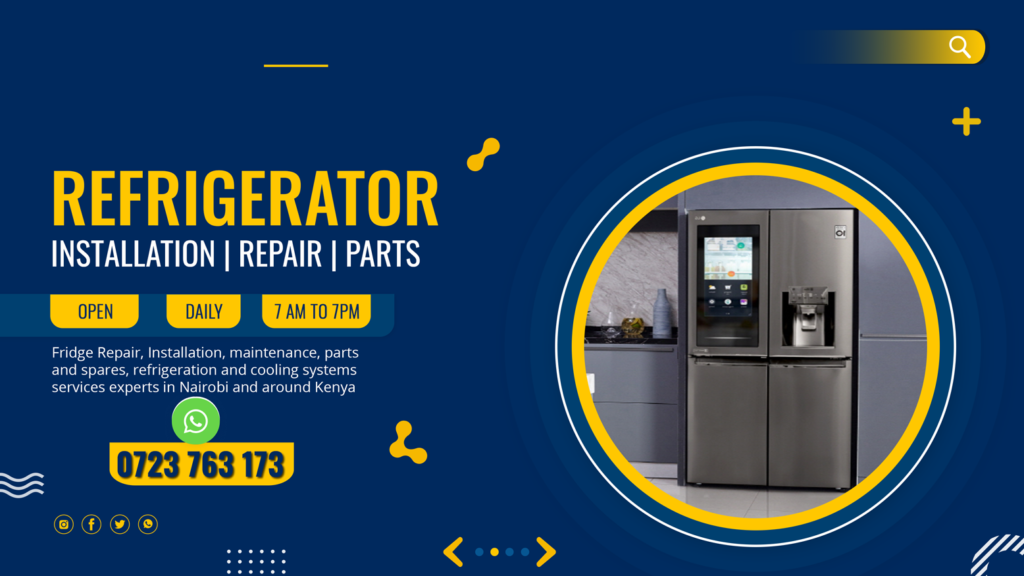Excellent Fridge Repair in Nairobi, Kenya
Are You Looking for Refrigerator Repair Services “Near Me” or Refrigerator Repair “In Nairobi“? Get the best #1 Fridge Repair Services in Nairobi and Kenya. Fridge Repair-KE is a top provider of reliable Refrigerator repair needs in Nairobi and allover Kenya. Our expert technicians specialize in diagnosing and fixing a wide array of refrigerator issues, ensuring efficient and lasting solutions. Whether it’s a domestic fridge, commercial fridge, or specialized units like beer and wine chillers, we offer professional repairs using genuine parts and industry best practices. Count on us for quality service, and a commitment to restoring your fridge’s functionality instantly.

Fridge Repair in Nairobi for All Refrigerator Types
When your are looking for technicians to render the best Fridge Repair in Nairobi, Freezer Repair in Kenya, Cold room installation services, Refrigerator Service, Air conditioner repair, Ventilation systems installation, and cooling systems services, its best to work with professionals for optimal results.
Choose to Work With Fridge Repair Professionals
When your are looking for technicians to render the best Fridge Repair in Nairobi, Freezer Repair in Kenya, Cold room installation services, Refrigerator Service, Air conditioner repair, Ventilation systems installation, and cooling systems services, its best to work with professionals for optimal results.
Fridge Spare Parts
- Fridge Fan Motors, Ice Makers
- Light Bulbs, Temperature Sensors
- Fridge Water Dispenser
- Fridge Drain Pans
- Fridge Doors
- Refrigerator Shelves


Beer Chiller Repair in Nairobi
Beer chillers, also known as beer coolers or kegerators, are appliances designed to keep beer at the optimal serving temperature. They come in various sizes and designs, from small countertop units to larger freestanding ones used in bars and restaurants.
“Reliable Fridge Repair Services in Nairobi”

Judy Bolo
Nairobi
FRIDGE GAS REFILL / REFRIGERANT RELOADING IN NAIROBI & KENYA
Fridge Repair Kenya, a leading service provider in Nairobi, offers comprehensive fridge refrigerant refilling services, catering to a diverse range of refrigeration systems. Their specialized expertise involves meticulous assessment of refrigerant levels, identifying leaks or deficiencies, and executing precise refilling procedures with high-quality refrigerants. Employing skilled technicians equipped with modern diagnostic tools and adhering to industry standards, Fridge Repair Kenya ensures efficient, reliable, and environmentally conscious refrigerant refills for various fridge models, ensuring optimal cooling performance and extending the lifespan of refrigeration units across Nairobi.
Fridge Spares and Parts in Nairobi, Kenya

Fridge Repair Kenya Updates
-
Cold Room Fault Diagnosis Services in Kenya
Cold Room Fault Diagnosis Services in Kenya In Kenya’s rapidly growing food processing, pharmaceutical, and hospitality industries, cold rooms play
-
Cold Room Parts and Spares
Cold Room Parts and Spares By Fridge Repair Kenya Cold rooms are essential infrastructure for businesses across Kenya, from hotels
-
Kirinyaga Cold Room Installation and Repair Services › 0723763173
Kirinyaga Cold Room Services: Access to professional cold room services at Kirinyaga becomes increasingly critical for business success. Whether you
-
Kajiado County Cold Room Installation and Repair Services › 0723763173
Kajiado County Cold Room Services: Access to professional cold room services at Kajiado County becomes increasingly critical for business success.
-
Kiambu Cold Room Installation and Repair Services › 0723763173
Kiambu Cold Room Services: Access to professional cold room services at Kiambu becomes increasingly critical for business success. Whether you
-
Gilgil Cold Room Installation and Repair Services › 0723763173
Gilgil Cold Room Services: Access to professional cold room services at Gilgil becomes increasingly critical for business success. Whether you
-
Industrial area Cold Room Installation and Repair Services › 0723763173
Industrial area Cold Room Services: Access to professional cold room services at Industrial area becomes increasingly critical for business success.
-
Juja Cold Room Installation and Repair Services › 0723763173
Juja Cold Room Services: Access to professional cold room services at Juja becomes increasingly critical for business success. Whether you
-
Kitui Cold Room Installation and Repair Services › 0723763173
Kitui Cold Room Services: Access to professional cold room services at Kitui becomes increasingly critical for business success. Whether you
FULL LIST OF FRIDGE, FREEZER, COLDROOM, AND REFRIGERATOR SERVICES
[pt_view id=”279539e39i”]Call Now For Inquiries
Call To Inquire about Fridge Repair Services
